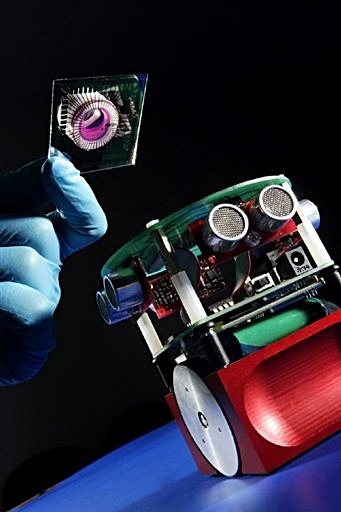Science Fiction
Dictionary
A B C D E F G H I J K L M N O P Q R S T U V W X Y Z
Rat Brain Robot Uses Cultured Rat Neurons

Cultured rat neurons placed on a multi-electrode array (MEA) form the brain of Gordon the robot. This brain is housed in a special temperature-controlled unit separate from the robot; Bluetooth is used for control signals.
The rat neurons life in a nutrient-rich medium kept at a constant temperature; they organize themselves within several weeks, organizing themselves based on electrical impulses received from sensors in the wheels.

(Meet Gordon, a rat neuron-controlled robot.)
"The purpose is to figure out how memories are actually stored in a biological brain," said Kevin Warwick, a professor at the University of Reading and one of the robot's principle architects."If we can understand some of the basics of what is going on in our little model brain, it could have enormous medical spinoffs."
(Gordon, a rat neuron-controlled robot video.)
Incredibly, different MEA-based brains show different personalities; Gordon has several 'spare' brains that can be plugged in.
"It's quite funny -- you get differences between the brains," said Warwick. "This one is a bit boisterous and active, while we know another is not going to do what we want it to."
Science fiction readers are thoroughly familiar with this idea; laminated mouse brains are used to pilot interstellar ships in the 1962 story Think Blue, Count Two by Cordwainer Smith.
See also Peter Watts' head cheese from his 1999 novel Starfish, which is a pretty exact match for Gordon's brain.
From Breitbart; thanks to Moira for prodding me into doing this story.
Scroll down for more stories in the same category. (Story submitted 8/15/2008)
Follow this kind of news @Technovelgy.| Email | RSS | Blog It | Stumble | del.icio.us | Digg | Reddit |
Would
you like to contribute a story tip?
It's easy:
Get the URL of the story, and the related sf author, and add
it here.
Comment/Join discussion ( 3 )
Related News Stories - (" Biology ")
Black Fungus Blocks Radiation
'You were surrounded by Astrophage most of the time' - Andy Weir, 2021.
Lunar Biorepository Proposed For Cryo-Preservation Of Earth Species
'...there was no one alive who had ever seen them. But they existed in the Life Bank.' - John Varley, 1977.
Let's Make Slaver Sunflowers! Engineering Plants To Reflect Light
'The mirror-blossom was a terrible weapon.' - Larry Niven, 1965.
Machete-Wielding Philodendron Isn't Going To Take It Anymore
'The tree ended its wild larruping, stood like a dreaming giant liable to wake into frenzy at any moment.' - Eric Frank Russell, 1943.
Technovelgy (that's tech-novel-gee!) is devoted to the creative science inventions and ideas of sf authors. Look for the Invention Category that interests you, the Glossary, the Invention Timeline, or see what's New.
Science Fiction
Timeline
1600-1899
1900-1939
1940's 1950's
1960's 1970's
1980's 1990's
2000's 2010's
Current News
The New Habitable Zones Include Asimov's Ribbon Worlds
'...there's a narrow belt where the climate is moderate.'
Can One Robot Do Many Tasks?
'... with the Master-operator all you have to do is push one! A remarkable achievement!'
Atlas Robot Makes Uncomfortable Movements
'Not like me. A T-1000, advanced prototype. A mimetic poly-alloy. Liquid metal.'
Boring Company Drills Asimov's Single Vehicle Tunnels
'It was riddled with holes that were the mouths of tunnels.'
Humanoid Robots Tickle The Ivories
'The massive feet working the pedals, arms and hands flashing and glinting...'
A Remarkable Coincidence
'There is a philosophical problem of some difficulty here...'
Cortex 1 - Today A Warehouse, Tomorrow A Calculator Planet
'There were cubic miles of it, and it glistened like a silvery Christmas tree...'
Perching Ambush Drones
'On the chest of drawers something was perched.'
Leader-Follower Autonomous Vehicle Technology
'Jason had been guiding the caravan of cars as usual...'
Golf Ball Test Robot Wears Them Out
"The robot solemnly hit a ball against the wall, picked it up and teed it, hit it again, over and again...'
Boring Company Vegas Loop Like Asimov Said
'There was a wall ahead... It was riddled with holes that were the mouths of tunnels.'
Rigid Metallic Clothing From Science Fiction To You
'...support the interior human structure against Jupiterís pull.'
Is The Seattle Ultrasonics C-200 A Heinlein Vibroblade?
'It ain't a vibroblade. It's steel. Messy.'
Roborock Saros Z70 Is A Robot Vacuum With An Arm
'Anything larger than a BB shot it picked up and placed in a tray...'
A Beautiful Visualization Of Compact Food
'The German chemists have discovered how to supply the needed elements in compact, undiluted form...'
Bone-Building Drug Evenity Approved
'Compounds devised by the biochemists for the rapid building of bone...'
